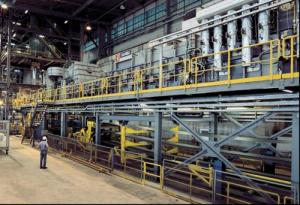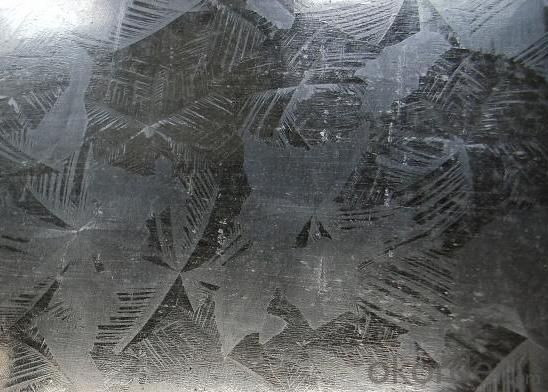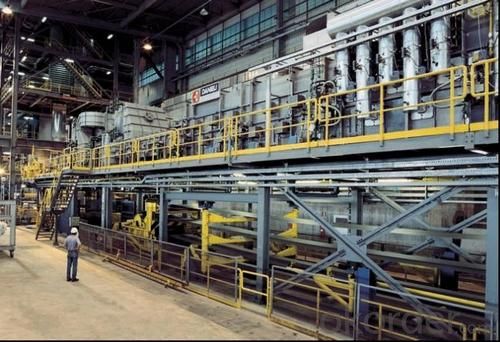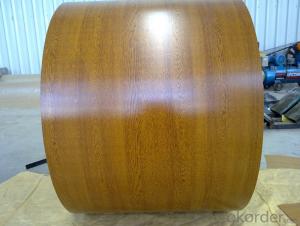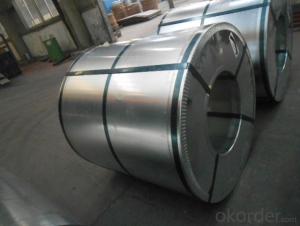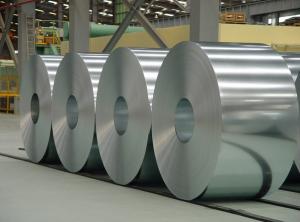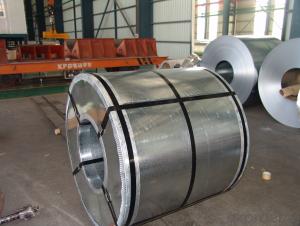Best Quality-Hot Dip Galvanized Steel Coil -Regular Spangle
- Loading Port:
- China Main Port
- Payment Terms:
- TT or LC
- Min Order Qty:
- 50mt m.t.
- Supply Capability:
- 10000 tons per month m.t./month
OKorder Service Pledge
OKorder Financial Service
You Might Also Like
General Information Of Hot Dip Galvanized Steel Coil
Hot-dip galvanized steel coils are available with a pure zinc coating through the hot-dip galvanizing process. It offers the economy, strength and formability of steel combined with the corrosion resistance of zinc. The hot-dip process is the process by which steel gets coated in layers of zinc to protect against rust. It is especially useful for countless outdoor and industrial applications.
|
Thickness 0.13-0.7mm (BMT) |
|
Width 600-1250mm |
|
Zinc Coating 30-200g/m2 |
|
Internal Diameter 508mm or 610mm |
|
Coil Weight 3-12MT |
|
Quality Commercial and structural quality |
|
Spangle regular spangle |
|
Surface Treatment Oiled/dry , Skin pass/non-skin pass ,Chromated/non-chromated |
|
Standard JIS G 3302, ASTM A 653M, EN 10327 |
|
Steel Grade SGCC, CS, FS, SS, LFQ, DX51D+Z , S280GD |
Chemical Composition Of Hot Dip Galvanized Steel Coil
|
C |
Si |
Mn |
P |
Si |
|
0.04-0.06% |
0.01-0.03% |
0.18-0.22% |
0.014-0.016% |
0.006%-0.009% |
Technical Data Of Hot Dip Galvanized Steel Coil
|
Yield Strength |
(Mpa) 280-320 |
|
Tensile Strength |
(Mpa) 340-390 |
|
Elongation |
20%-30% |
|
Out-of-square |
not exceed 1% Flatness |
|
Bow |
15mmmax |
|
Edge Wave |
9mmmax |
|
Centre Buckle |
8mmmax |
|
Bending At 180 Degree |
No crack, purling and fraction |
Application Of Hot Dip Galvanized Steel Coil
Production of cold formed corrugated sheets and profiles for roofing, cladding, decking, tiles, sandwich walls, rainwater protective systems, air conditioning duct as well as electrical appliances and engineering
With GI as base metal, after pretreatment (degrease and chemical treatment) and liquid dope with several layers of color, then after firing and cooling, finally the plate steel is called pre-painted galvanized steel. Pre-painted galvanized steel is good capable of decoration, molding, corrosion resistance. It generally displays superior workability, durability and weather resistance.
Packaging & Delivery Of Hot Dip Galvanized Steel Coil
Anti-damp paper inside full wrapped with plastic film, iron sheet outside on wooden pallet in 20 feet container with 25mt.
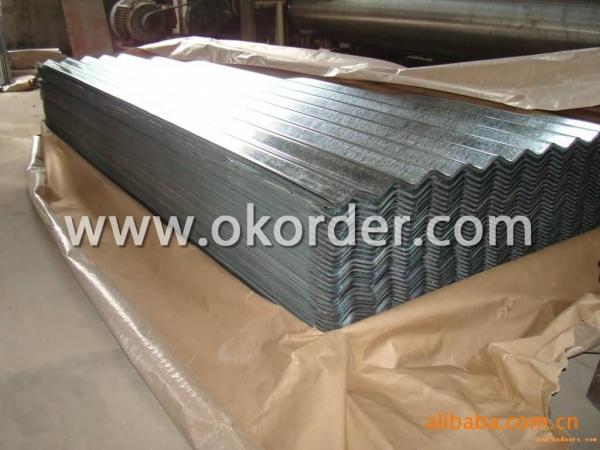
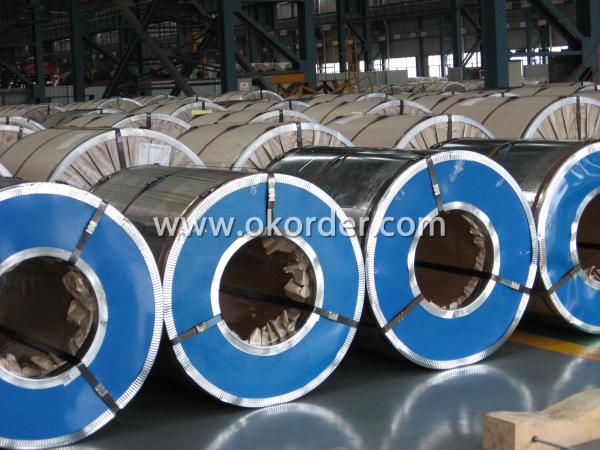
- Q: What are the challenges in coil slitting for narrow strip widths?
- The challenges in coil slitting for narrow strip widths include maintaining consistent tension throughout the process, minimizing edge burrs and camber, preventing material damage or deformation, and ensuring accurate width measurements and tolerances. Additionally, handling and feeding thin strips can be more difficult, as they are more prone to wrinkling, telescoping, or jamming during the slitting operation. Overall, achieving precision and high-quality results in coil slitting for narrow strip widths requires advanced equipment, expertise, and careful attention to detail.
- Q: I just purchased this Benchmade knife with m390 steel blade and it cost me a fortune but I wanted to know if this new steel is a tool steel. what classifies a tool steel. M390 = 1.9 carbon, 20. chromium, .30 manganese, 1. molybdenum, .60silicon, .60 tugsten, 4. vanadium at 60-62 HRC
- Congratulations you can read a table of steels. Yes M390 is a tool steel. Blades is one application as is the manufacture of injection moulding tools.
- Q: What are the different methods of shearing steel coils?
- There are several methods used for shearing steel coils, including rotary shearing, slitting, and laser cutting. Rotary shearing involves the use of rotating blades to cut the coil into smaller sections. Slitting involves passing the coil through a set of circular blades that make multiple cuts parallel to the coil's width. Laser cutting, on the other hand, uses a high-powered laser beam to precisely cut through the steel coil. Each method has its advantages and is chosen based on factors such as the desired accuracy, speed, and type of steel being cut.
- Q: i wanna know all the similarities between iron and steel
- Iron is raw from iron ore, steel has other metals added such as alloys or copper to give tesil strength and flexibility
- Q: How are steel coils used in the automotive stamping industry?
- Steel coils are used in the automotive stamping industry to provide a continuous supply of flat steel sheets that are then fed into stamping machines. These coils are unrolled, straightened, and then fed through the stamping presses to create various automotive parts, such as body panels, chassis components, and other structural parts. The use of steel coils ensures efficiency, precision, and a consistent quality in the production of automotive parts.
- Q: bullets are normally made out of lead...are there bullets that are completely steel?? (not plated)
- Not for small arms and not for conventional artillery. In both cases, the projectile has to engage the rifling, which requires a material soft enough to upset into the grooves yet tough enough to stand up to the friction and the pressure. Small arms projectiles, even if the core is steel, must have at least a jacket of softer material, usually a copper alloy, to engage the rifling and seal the bore. Artillery projectiles for rifled weapons use driving bands of bronze or a similar alloy for the same reason. The Germans during World War II and probably some other resource-strapped armed services have used sintered iron bullets for handgun rounds such as 9mm Luger (I have a box, but have never shot one because of their value to collectors), but sintered iron is too fragile for the higher velocities and energies of rifle rounds. Several companies do make sporting bullets entirely of copper, which is a way to solve the problem conventional bullets sometimes have with shedding the jacket on impact with a game animal. You'll also find lots of foreign military ammo with cartridge cases made of mild steel. Russian and Chinese 7.62x39 often has these steel cases. You'll find tens of thousands of them rusting on the ground at rifle ranges all over the country. The bullets have a softer jacket, usually a copper alloy. Armor-piercing ammo has a core of hardened steel, but a jacket of copper alloy.
- Q: What is the tensile strength of a steel coil?
- The maximum stress or force that a steel coil can endure before breaking or undergoing permanent deformation is known as its tensile strength. This property measures the coil's capacity to withstand stretching or pulling apart. The specific tensile strength of a steel coil can vary based on factors such as the type and grade of steel used, the manufacturing process, and any additional treatments or coatings applied. Typically, steel coils exhibit high tensile strength, which falls within the range of 300 to 2,000 megapascals (MPa). When considering the suitability of a steel coil for applications in industries like construction, automotive, or manufacturing, the tensile strength is a crucial factor to take into account.
- Q: How are steel coils used in the production of HVAC equipment?
- Steel coils are commonly used in the production of HVAC equipment as they serve as the primary component in heat exchangers. These coils are responsible for transferring heat between the refrigerant and the air, allowing the equipment to cool or heat the surrounding space effectively. The steel coils are designed to maximize surface area and optimize heat transfer, ensuring efficient and reliable operation of HVAC systems.
- Q: What are the factors affecting the formability of steel coils?
- There are several factors that can affect the formability of steel coils, including the composition and microstructure of the steel, the thickness and width of the coils, the temperature at which the forming process takes place, the lubrication used during forming, and the equipment and techniques employed.
- Q: gigantic navy ships made of steel float, why??
- They okorder /... Or use the search bar*. (The question has been answered a thousand and one times). If you do then you will read many answers that push the popular myth that they displace more water than they weigh (as if some unseen 'finger of god' is supplying a mystery force in addition to the vessel's weight). Such 'explanations' cannot be supported by either calculation or experiment and are wishy-washy drively nonsense. So beware of Archimedes' Trolls on this one!
1. Manufacturer Overview
| Location | Shandong, China |
| Year Established | 2007 |
| Annual Output Value | |
| Main Markets | 90.91% Domestic Market 4.09% Southeast Asia 3.18% Africa 1.82% South America |
| Company Certifications | ISO 9001:2008 |
2. Manufacturer Certificates
| a) Certification Name | |
| Range | |
| Reference | |
| Validity Period |
3. Manufacturer Capability
| a) Trade Capacity | |
| Nearest Port | Tianjin; Qingdao |
| Export Percentage | 71% - 80% |
| No.of Employees in Trade Department | 380 People |
| Language Spoken: | English; Chinese |
| b) Factory Information | |
| Factory Size: | Above 100,000 square meters |
| No. of Production Lines | 3 |
| Contract Manufacturing | OEM Service Offered Design Service Offered Buyer Label Offered |
| Product Price Range | Average |
Send your message to us
Best Quality-Hot Dip Galvanized Steel Coil -Regular Spangle
- Loading Port:
- China Main Port
- Payment Terms:
- TT or LC
- Min Order Qty:
- 50mt m.t.
- Supply Capability:
- 10000 tons per month m.t./month
OKorder Service Pledge
OKorder Financial Service
Similar products
Hot products
Hot Searches
Related keywords
